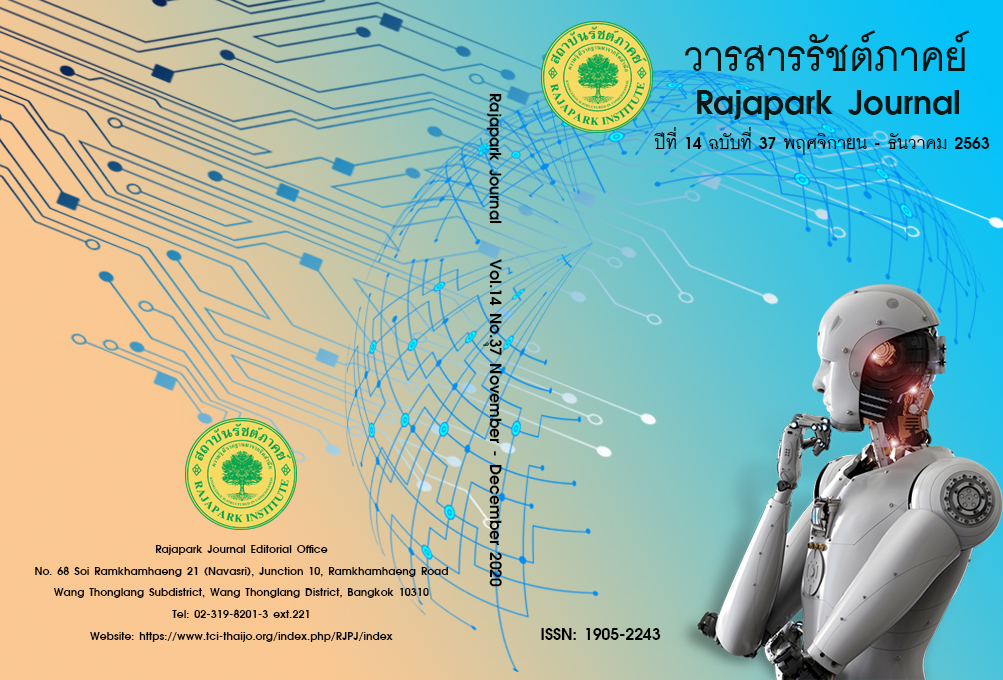ผลของกิจกรรมกลุ่มสัมพันธ์ต่อการเสริมสร้างการทำงานเป็นทีมของคณะกรรมการสภานักเรียน
Main Article Content
บทคัดย่อ
การวิจัยมีวัตถุประสงค์เพื่อ 1) เปรียบเทียบการทำงานเป็นทีมของคณะกรรมการสภานักเรียนระหว่างก่อนและหลังเข้าร่วมกิจกรรมกลุ่มสัมพันธ์ต่อการเสริมสร้างการทำงานเป็นทีม 2) เปรียบเทียบการทำงานเป็นทีมของคณะกรรมการสภานักเรียนที่เข้าร่วมกิจกรรมกลุ่มสัมพันธ์ต่อการเสริมสร้างการทำงานเป็นทีม และคณะกรรมการสภานักเรียนที่ไม่ได้เข้าร่วม และ 3) เปรียบเทียบการทำงานเป็นทีมของคณะกรรมการสภานักเรียนระหว่างหลังและระยะติดตามผลเข้าร่วมกิจกรรมกลุ่มสัมพันธ์ต่อการเสริมสร้างการทำงานเป็นทีม การวิจัยกึ่งทดลอง วัดก่อนและหลังการทดลอง ตัวอย่างคือคณะกรรมการสภานักเรียนประถมศึกษา ปีที่ 4-6 ปีการศึกษา 2562 เลือกกลุ่มตัวอย่างแบบเจาะจง 20 คน สุ่มอย่างง่ายเข้ากลุ่มทดลองและกลุ่มควบคุม กลุ่มละ 10 คน เครื่องมือคือแบบวัดการทำงานเป็นทีม และกิจกรรมกลุ่มสัมพันธ์ต่อการเสริมสร้างการทำงานเป็นทีม ผลการวิจัยพบว่า 1) คณะกรรมการสภานักเรียนที่เข้าร่วมกิจกรรมกลุ่มสัมพันธ์ หลังการเข้าร่วมกิจกรรมมีการทำงานเป็นทีมมากขึ้นอย่างมีนัยสำคัญทางสถิติที่ระดับ .05 2) คณะกรรมการสภานักเรียนที่เข้าร่วมกิจกรรมกลุ่มสัมพันธ์ มีการทำงานเป็นทีมมากกว่ากลุ่มที่ไม่ได้เข้าร่วมกิจกรรมกลุ่มสัมพันธ์อย่างมีนัยสำคัญทางสถิติที่ระดับ .05 และ 3) คณะกรรมการสภานักเรียนที่เข้าร่วมกิจกรรมกลุ่มสัมพันธ์ มีการทำงานเป็นทีมไม่แตกต่างเมื่อสิ้นสุดระยะติดตามผลอย่างมีนัยสำคัญทางสถิติที่ระดับ .05
Article Details
ทัศนะและความคิดเห็นที่ปรากฏในวารสาร ถือเป็นความรับผิดชอบของผู้เขียนบทความนั้น และไม่ถือเป็นทัศนะและความรับผิดชอบของกองบรรณาธิการ
เอกสารอ้างอิง
Changchat, S. (1999). Organizational Behaviors. Phitsanulok: Faculty of Management Science, Pibulsongkram Rajabhat University.
Daekhuntod, K. (2012). The Effects of Group Dynamic Based on Sufficiency-Economy to Enhance Happiness of Second Grade Level Students at Jaturakamsamakkee School, Nakhon Ratchasima Province. Master of Arts in Educational Psychology and Guidance. Kasetsart University.
Department of Curriculum and Instruction Development, Ministry of Education. (1998). Learning Process Document. Bangkok: Khurusapha Ladprao Publisher.
Getkham, V., & Chatsupakul, K. (1999). Group Dynamics. Bangkok: Odeon Store.
Khajonnan, N. (2003). Team building and team efficiency. Bangkok: Expernet Co.,Ltd.
Khemmani, T. (1993). Teaching Activities and Group Process Skills for Students. Bangkok: Bophit Printing.
Laohanan, S. (1999). Human Resource Management. Bangkok: Bansomdejchaopraya Rajabhat University.
Panich, V. (2013). The 21st Century Enhancing Learning. Bangkok: Siam Commercial Foundation.
Popboon, J. (2013). The Effect of Group Dynamics in Development of Grade 5th Students’ Public Mind. Thesis Master of Education in Educational Psychology and Guidance. Mahasarakham University.
Romig, D. A. (1996). Breakthrough teamwork: Outstanding results using Structured Teamwork. Chicago: Irwin Professional Pub.
Sombat, L. (2002). Management Strategyin Social Welfare Administration and Policy. Bangkok: Thammasat University Press.
Spector, P. E. (2006). Industrial and Organizational Psychology: Research and Practice (4th ed.). NY: John Willey & Sons, Inc.
Tarricone, P., & Luca, J. (2002). Successful teamwork: A case study. in Quality Conversations, Proceedings of the 25th HERDSA Annual Conference, Perth, Western Australia, July 7-10, 2002, pp. 640-646. https://ro.ecu.edu.au/ecuworks/4008
The Royal College Pediatricians of Thailand & Pediatric Society of Thailand. (2017). A guide to Develop Children for Parents: School Age 6-12 years. Bangkok: The Royal College Pediatricians of Thailand & Pediatric Society of Thailand.
Wiengkham, S. (2000). Use of Group Process to Promote Prathom Suksa 4 Students Behavior Concerning Democracy as a Way of Life. Independent Study of Elementary Education. Chiang Mai University.


